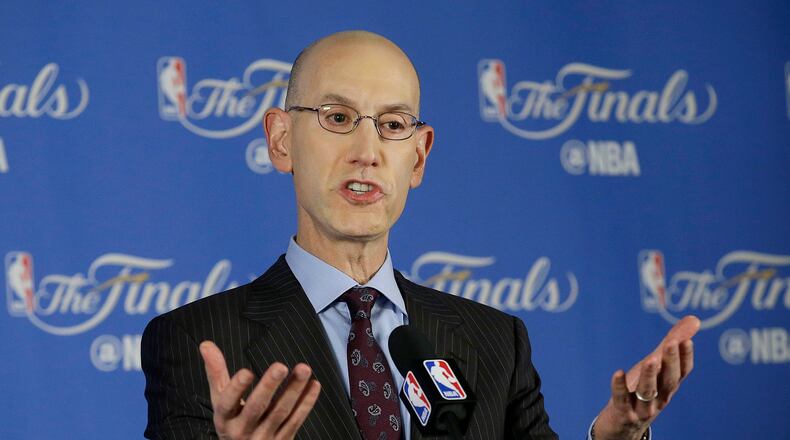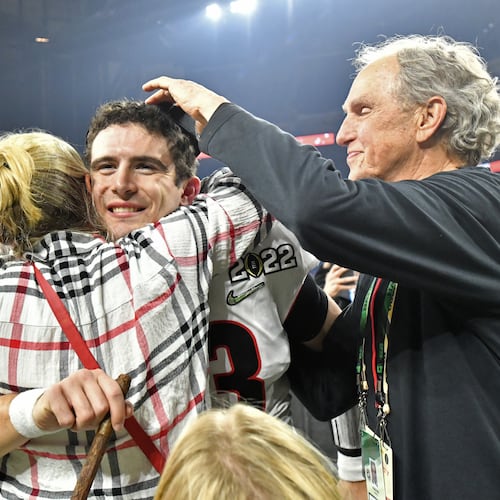Granted, sport has provided a shot in the arm for a weary, house-bound public.
Now comes the question of whether those who have provided this service are due a shot in the arm themselves. In this case, the literal you’re-going-to-feel-a-slight-prick-now kind, the one delivering a COVID-19 vaccine and a dose of peace of mind.
Toward the end of the long, long waiting line for the vaccine, back there where the young and healthy athletes are now biding time, there have been murmurs about maybe moving up. Up where the health-care workers and the seniors and front-line essential folk such as police and teachers stand ready.
Excuse me, grandma, please step back, the Lakers are here to get their shots.
Popping up, for instance, has been random speculation about giving NBA players preference in the vaccine lottery, as the league deals with positive tests and postponements.
Some of it absurd: TNT NBA analyst Charles Barkley declaring on air that pro athletes should be escorted to the front of the line because they pay more taxes. “They deserve preferential treatment,” he said on air, forever ruining his shot at becoming surgeon general. Don’t know exactly when Barkley turned into an economic Darwinist, but it’s as bad a look on him as skinny jeans.
Some of it that makes you go hmmmm: NBA Commissioner Adam Silver suggesting that vaccinating players now would serve to promote the treatment, especially among hard-hit and hesitant segments of the Black population. It’s not privilege, it’s a public-service announcement, you see.
If even the New York Knicks could hit on 100% of these shots, think about what a powerful statement that would be.
A medical ethicist at Emory, director of the Healthcare Ethics Consortium, Kathy Kinlaw, is not so sure about that.
“Athletes and other well-known figures can participate by speaking up, by indicating their support for the vaccine now and their readiness to take the vaccine when it is their turn. I don’t know that they actually have to receive it to make clear their support,” she said.
“I don’t know that one needs to jump the line in order to be able to make the same kind of strong claims and be heard,” she added.
In general, the sports world has been careful to avoid any impression it would cut in line to get the vaccine to keep the games and the money flowing. You’ll not find a mid-week Clippers-Jazz game anywhere in the definition of the word “essential.” There is enough resentment out there toward the rich and pampered athlete without him also becoming that guy who worms his way in at the front of line for movie tickets (remember when there were movies?).
Other arguments are bubbling up from the Olympic movement. The delayed Summer Games remain on for late July in Japan, which seems like a long way off, but there is still a push to get athletes vaccinated before training and trials and, ultimately travel to Tokyo.
Singapore authorities have said their potential Olympians will get priority status. IOC member Dick Pound suggested the best way to ensure the Games would be to begin vaccinating athletes now. Speaking of his native Canada, Pound said, “We might have 300 or 400 athletes. To take 300 or 400 vaccines out of several million in order to have Canada represented at an international event of this stature, I don’t think there would be any kind of public outcry about that.”
Maybe in Canada, where everyone is nice and polite, that would fly. Don’t think it would be greeted quite so meekly in New Jersey.
In the grand scheme, no, the numbers aren’t that large, not when talking about tens of millions of doses. But especially in a time like now when the supply line is stretched and ragged, any number would grate. Like, say, around 450 NBA players, 750 in the NHL, 4,500 DI scholarship basketball players, 125 PGA players, 800 MLS players, the 40-man roster on 30 MLB teams.
And why would we stop there? What about all those other performers who have provided such quality entertainment during this dark last year, like the cast of “Love After Lockup,” Mama June and various Swamp People?
I have to believe that this is mostly idle talk and supposition, that no sports league would dare do something so optically awful as to jump this line. It’s a topic to definitely tiptoe around, as did MLB in this statement to the Boston Globe: “In conjunction with our team of medical experts, we are tracking all developments related to vaccines. We are working on plans both to promote vaccination and to ensure that the members of our industry are vaccinated at an appropriate time.”
And even if it were allowed, what young, strong, aware athlete would take one of the scarce doses knowing that so many other vulnerable people were still waiting? That would be a tough conversation with the fellow in the mirror.
“The reality,” Kinlaw said, “is that everybody is going to be able to receive the vaccine in coming months. It’s not a case of you get or you don’t get it. We’re simply saying how do we fairly provide the vaccine to those who are most vulnerable early?”
“I know the value and power of being able to support sports and for all of us to have the enjoyment of it, but is it an essential function in society? I think there are others that need to come first,” she added.
About the Author
The Latest
Featured



